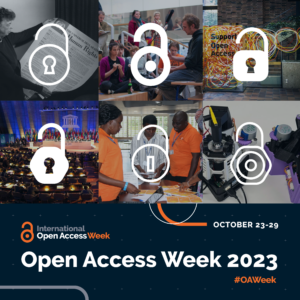
October 23-29, 2023 is Open Access Week. This is an opportunity to celebrate and advocate for equitable information access for all. Open Access publishing models make a diverse set of perspectives freely available, rather than restricting access to only those with institutional credentials that remove paywalls.
This year’s theme, Community over Commercialisation, asks us to consider how Open Access can allow for information sharing that is both community-supported and community-controlled. Because we recognize that Information has Value, including the power to influence, educate, and negotiate understanding, we also recognize that publishing practices that prioritize corporate profits over access undermine a community’s ability to thoughtfully engage in discourse.
Community is a core value at Gustavus, and we in the library see Open Access as one way that we can uphold and foster this value. Out of a “pervasive sense of concern for every member of the Gustavus community,” the library works to promote Open Access as a means to mitigate textbook costs for students; teach students and faculty the skills and technology to make their work widely available; promote and support the excellent scholarship of our faculty; and to more generally foster equitable information access.
So what does this look like in practice?
- We promote open access resources such as the Directory of Open Access Journals and Open Educational Resources.
- We’ve established and continue to expand GustieScholar, our institutional repository, which provides open access to research produced by our community. Read more about GustieScholar.
- And in the Library, we hold ourselves to the same standards we promote with our Open Access Pledge.
Where can I learn more?
For more information, take a look at our Open Access LibGuide.
For further reading:
- An entire book on the subject by Peter Suber (the library also has a print copy)
- For faculty: Open access without tears
- For students: Open textbooks and the Right to Research Coalition
- For alumni who lose access to our databases when they graduate: Post-graduation resources
During this week – and beyond – please explore open access. Consider how you can make your own work freely accessible and advocate for information to be openly available.
Looking for more information on Open Access? Contact a librarian!